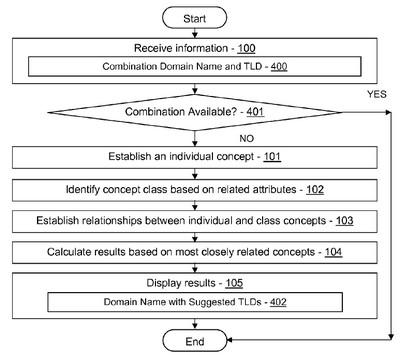Company files patents for improving current domain suggestion and advertising systems.
Go Daddy Group, Inc., parent company of domain name registrar GoDaddy, has filed three patents for a method of suggesting possible domain names. The applications also suggest this method can be used for targeted advertising, search results, and web site content. The applications were filed in 2008 and published by the U.S. Patent and Trademark Office on October 1.
In the patent applications, Go Daddy says current systems for suggesting related domain names generally use synonyms of imputed keywords to create suggestions. GoDaddy’s proposed method creates a sophisticated ontology to calculate results.
Currently-used algorithms to display concept-based results may be based on synonyms of keywords received. This approach may limit the results to only synonyms of keywords.
The current invention may use, but is not limited to, ontological based algorithms to calculate and display results (Step 105). These algorithms may be in addition to, but are independent of any synonym-based algorithms. This allows results to be displayed which may include concepts related to the information received and not just synonyms alone (Step 700).
The method can be extended in many ways:
1. Suggest a corresponding top level domain name – the content of the suggested domain name could relate to a particular gTLD, such as .info for a domain concept related to information or .shop for a concept related to buying a product. It could also suggest an appropriate country code domain name, such as .co.uk if the spelling of one of the words uses a British spelling (e.g. colour).
2. Make keyword suggestions for an online advertising campaign – based on as little information as the domain name being advertised, a system could suggest keywords to advertise on.
3. Targeting advertising on a parked page (or web site) – the system could better target ads on parked pages based on its ontology, compared to simple keyword and synonym analysis generally used for parked pages. See #4 below for how this might work.
4. Relevant content on web sites – content and navigation could be generated on a web site based on the concepts in the domain name, the anchor text of a link clicked to visit the web site, or a number of other factors related to the page’s concept.
Suggesting Concept-Based Domain Names
Suggesting Concept-Based Top Level Domain Names
Displaying Concept-Based Targeted Advertising







Technically, they’ve filed patent applications (or, “filed for patents”); not patents.
They’re a loooooooooooong way (5+ years) from patents; if they even have them allowed.